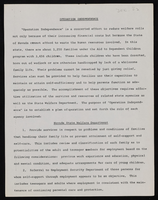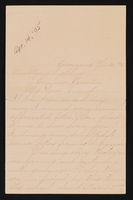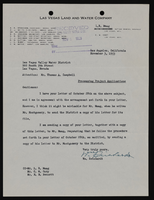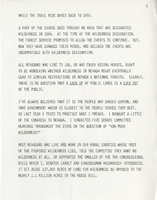Search the Special Collections and Archives Portal
Search Results
Sister Klaryta Antoszewska Photograph Collection
Identifier
Abstract
The Sister Klaryta Antoszewska Photograph Collection (1977-1991) consists of photographic slides that depict various Nevada, United States, and international nuclear test protests. The collection includes images of Sister Klaryta Antoszewska and Sister Rosemary Lynch, as well as images of the Lenten Desert Experience and numerous protests at the Nevada Test Site. Also included are images of nuclear testing, soldiers, and anti-nuclear testing promotional materials.
Archival Collection

Operation Independence summary and work program draft: reports
Date
Archival Collection
Description
From the Clark County Economic Opportunity Board Records -- Series II: Projects. This folder contains reports on Operation Independence, a work program draft on Operation Independence, report of medical advisory committee, an adult education survey, and a memorandum to operation independence.
Text

Transcript of interview with Rosemary A. Vassiliadis by Stefani Evans and Claytee White, April 12, 2017
Date
Archival Collection
Description
“My very first car… Oh, boy, I can't remember the year. It was old. But it was a [Chevrolet] Monte Carlo. Oh, my gosh, I was so excited. . . . It was my pride and joy. I'm a teenager, right? It was freedom. That's what it was.” It might seem incongruous that the aviation director for the nation’s eighth busiest airport ranked by passenger volume would begin an oral history rhapsodizing over the freedom her first car represented. But despite the powerful role she occupies professionally, Rosemary Vassiliadis remains true to her Chicago upbringing in a tight-knit Italian family, in which she was the first female on both sides to go to a four-year college. Rosemary attended nearby DePaul University, where she earned her degree in accountancy. Shortly before she graduated she was a bridesmaid for an Italian friend whose Greek Orthodox groom had asked Billy Vassiliadis to be his groomsman. Over the three days of the wedding Rosemary and Billy became acquainted and began a long-distance courtship that continued for nearly nine years before Rosemary finally agreed to marry Billy and make Las Vegas her home. This oral history chronicles Rosemary Vassiliadis’s Las Vegas career from financial analyst with the City of Las Vegas under Myron Leavitt to working with Randy Walker at Clark County to working with him again as deputy director of aviation at McCarran Airport; she shares how both men mentored her, and how their teaching has in turn inspired her to mentor younger women leaders. She talks about managing the airport in the six days after the Nine-Eleven (9/11) Terrorist Attacks, during which time Walker, who had been attending a conference in Montreal, was grounded there when all North American airports closed; she talks about working cooperatively with the Las Vegas Convention and Visitors Authority to transport tourists once the other airports opened, and she confides her determination to get her New York passengers home first so they could learn the fates of, comfort, and draw comfort from their loved ones. She walks listeners through the process of planning for Terminal 3, including financing it during the downturn, selecting its art, and seizing the opportunity to thank President Obama in person for making Terminal 3 possible-a “thank you” that resulted in an autographed photograph of the aviation director with the President as they stood on the tarmac in front of said terminal. While Rosemary’s ideas of freedom and transportation have likely matured since she bought her first gas guzzler in Chicago, she has acquired a firm grasp on what it takes to run the eighth-largest passenger airport in the U.S., which in 2017 serves the second-most popular U.S. travel destination (after New York City, according to TripAdvisor). Las Vegas is lucky that Rosemary agreed to serve as her friend’s bridesmaid and to eventually say “yes” to the persistent (and patient) Billy Vassiliadis. In 2017, Clark County School District recognized the couple’s many contributions by establishing the Billy & Rosemary Vassiliadis Elementary School.
Text

Transcript of interview with Barbara Agonia by Suzanne Becker, September 17, 2007, September 25, 2010, & October 2, 2007
Date
Archival Collection
Description
When Barbara Agonia arrived in Las Vegas in 1969 to pursue a Master's Degree in English, the University of Nevada Las Vegas was barely ten years old and the population of Las Vegas was just approaching 160,000 residents. At the time, she was 35 years-old and it was a decision and move that would forever change her life and higher education in Clark County. Barbara Agonia was born in St. Louis, Missouri, in 1934 to Robert Lewis Klinefelter and Suzanne Carter Klinefelter. At the time of Barbara's birth, her father worked for Brown Shoe Company in St. Louis. The family moved to Bunker Hill, Illinois when Barbara was still an infant. This was Mr. Klinefelter's hometown where a portion of the extended family still resided. In the late 1930s, Mr. Klinefelter got a job in a brass mill near Alton, Illinois, and he commuted there daily. When the United States entered World War II, Mr. Klinefelter tried to enlist in the army, but was rejected because he had two small children and because he worked in an essential industry. He decided to work in a non-essential industry and took a job at Montgomery Ward in Oak Park, Illinois. Barbara was in the third grade that year. Still unable to enlist, Mr. Klinefelter moved the family to Wabash, Indiana, and began working for General Tire in 1943. They moved to Logansport, Indiana in 1947. Agonia recounts that education has always been a significant part of her life, with the importance of a good education stressed in her life from early childhood forward. After graduating from high school in Logansport, Indiana, she attended Hanover College in southern Indiana, enrolling in 1952. Her educational experience at Hanover included a year studying abroad at the University of Exeter in Devonshire, England—an experience which Agonia credits as further cementing her commitment to education and her love of literature and language. She graduated from Hanover in 1957 with a double major in English and speech/ theater. Agonia spent her first years out of college teaching high school English, speech, and theater in west central Illinois and the next eight in northern Illinois. A little over ten years into her career, at the age of 35, she decided to pursue a Master's degree in English. Her sister, Martha, who at the time lived in Las Vegas, suggested checking into programs offered at the city's newly formed university. In 1969, Barbara moved to Las Vegas and enrolled in the English Department at UNLV. As Agonia was completing her degree in 1971, the community college system in Nevada was emerging and seeking faculty for the up and coming institution. Curious to know more about the new system, Agonia scheduled a meeting with the person in charge of hiring. Two hours later, she walked out with a contract in her hand, one of eight new faculty members at Clark County Community College, now known as College of Southern Nevada. In her early years with the college, Agonia did a great deal of public speaking on behalf on the newly formed system, promoting the new institution and reaching out to potential students. At the same time, she taught full course loads in composition and literature, and eventually became chair of the English department. Her new position and public speaking work on behalf of the college not only provided her contact with the local Las Vegas community, it ultimately became the catalyst in spurring her passion for community involvement, particularly working on behalf of women within the community. • • Vll As the 1980s approached, Agonia became actively involved in rape crisis education, at the urging of Florence McClure. Then, in 1980, Agonia was again in on the ground floor of community programming, when she and Beverly Funk, at the urging of Judith Eaton, the president of Clark County Community College, established a Women's Center on campus. The Center was initially set up to help women in a variety of life circumstances, including women who were wanting to return to school or who were new to the process of school altogether. The center eventually became the Re-Entry Center offering skill development, tutoring programs, and other forms of assistance for anyone interested in returning to school. In addition to her involvement in and commitment to public education, Agonia has also been involved in the Soroptimist International organization for business and professional women who work to improve the lives of women and girls in local and international communities. In the Las Vegas area, Soroptimist International of Greater Las Vegas worked to establish the Rape Crisis Center and the Center for Domestic Violence, which later became SafeNest. Agonia has been working with the organization since 1982. Through Soroptimist International, she also became involved in Friends of the Nevada Wilderness, an organization devoted to designation and long-term protection of Nevada's wilderness areas. As the representative for Soroptimist International, she traveled to Washington to lobby and testify in front of the senate for the establishment of Great Basin National Park. Agonia's work in the Las Vegas community over the past forty years has been significant. She counts Florence McClure, Geneva Douglas, and Jean Ford amongst her greatest influences. As she notes in her oral history, "I learned how to be radical from those women." She happily embraces the label of radical. This attitude surfaces throughout Agonia's experiences and recollections, and underscores her work and dedication to the interplay of local education and women's issues within Nevada.
Text
Leroy Burt oral history interview
Identifier
Abstract
Oral history interview with Leroy Burt conducted by an unidentified interviewer on July 01, 1986 for the Ralph Roske Oral History Project on Early Las Vegas. Burt’s wife is present during the interview.
Archival Collection
John E. Fulner oral history interview
Identifier
Abstract
Oral history interview with John Fulner conducted by Leonard Jones on March 28, 1976 for the Ralph Roske Oral History Project on Early Las Vegas. Fulner discusses the history of Southern Nevada.
Archival Collection

Letter (envelope missing) from Laura Lyman. Parowan, Utah to Mary Syphus, Panaca, Nevada
Date
Archival Collection
Description
From the Syphus-Bunker Papers (MS-00169). The folder contains an original handwritten letter, a typed transcription of the same letter, and a copy of original letter attached. Laura's last name "Lyman" is not included in letter or title, but there is correspondence with previous letter and location of Parowan, Utah.
Text
Lovey McCurdy oral history interview
Identifier
Abstract
Oral history interview with Lovey McCurdy conducted by Greg McCurdy on March 19, 1981 for the Ralph Roske Oral History Project on Early Las Vegas. Lovey recalls arriving in Las Vegas, Nevada in 1951, meeting white people in Las Vegas, Nevada, the atomic bomb testing, and other aspects of being part of the African American community during the 1950s and 1960s.
Archival Collection


